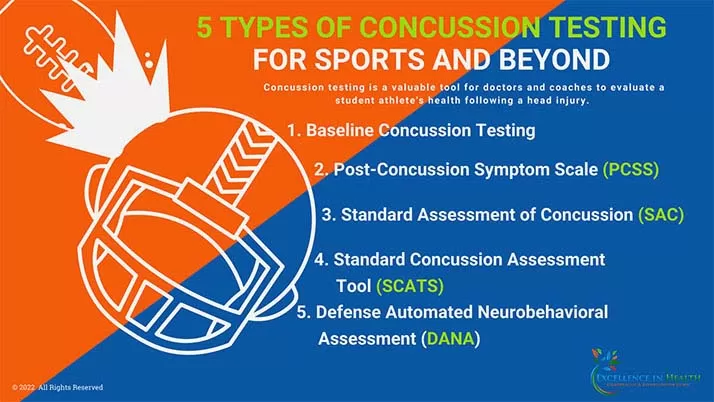Why Concussion Screening Is Crucial to Student Athlete Health
Protecting Young Athletes: The Importance of Concussion Screening in Schools

Child athletes are susceptible to concussions when playing school sports - especially in high-impact sports such as football, wrestling, or hockey. After experiencing a concussion, it's vital kids have an adequate recovery period before returning to regular activities and that precautions are taken to prevent repeat injuries. Excellence in Health specializes in helping teen athletes return to the activities they love.
We provide comprehensive treatment options to help student athletes get back to the sports and activities they love. Contact us to learn how we can support their healing journey.
What Is a Concussion?
A concussion is a mild type of traumatic brain injury (TBI). When people think of traumatic brain injuries, they typically think about harm that occurs after a major car accident or a fall that involves hitting one's head. But a concussion, which often occurs under less dramatic circumstances, is also a form of traumatic brain injury and can be equally as dangerous. Children are often susceptible to concussions, and even more serious TBIs, when playing contact sports like football, wrestling, or hockey.
What Are Common Concussion Symptoms?
Depending on the type or severity of the concussion, the signs and symptoms may be subtle and difficult to notice. It can be especially difficult to determine if younger children have experienced a concussion as they may struggle to explain exactly how they're feeling. Concussion symptoms may not show up immediately, but in some instances, they persist for days, weeks, or longer.
The most common symptoms of a concussion are physical symptoms such as:
- Ringing in the ears
- Nausea
- Fatigue
- Drowsiness
- Headache
- Vomiting
- Loss of memory
- Blurry vision
- Confusion
- Dizziness or "seeing stars"
What Causes a Concussion?
Your brain is made up of two types of matter: gray matter and white matter. Gray matter is less dense, and when a concussive injury occurs, such a blow to the head while playing sports or being in a car accident, the force of impact causes the gray matter to shear across the white matter. This shear force initiates a massive depolarization event in the brain that uses up the brain's energy stores and has a cascading effect on both the brain's HPA axis and the autonomic nervous system.
Several factors can lead to a concussion. Sudden deceleration or acceleration (such as a car accident) can cause brain injury. These injuries lead to signs and symptoms of a concussion. They may also lead to bleeding in or around the brain, which causes prolonged confusion and drowsiness. Seeking urgent care when you or someone else experiences concussion symptoms is vital. Brain bleeding can be fatal and requires careful and comprehensive monitoring to ensure symptoms do not worsen.
What Is Concussion Testing and Why Is it Done?
The symptoms of a mild to moderate concussion can be difficult to notice in some instances. However, seeking medical help to address the symptoms and reduce potential complications associated with any level of concussion is essential. Concussion testing is a tool doctors (and some school coaches and medical providers) use to evaluate and manage a student's Health after experiencing a head injury.
When used for student athletes, concussion testing evaluates your child brain's abilities after an injury. These tests assess thinking and processing capabilities. In some school systems, baseline concussion testing may be conducted before the beginning of the sports season in athletes at risk of head injuries during the season.
Types of Concussion Testing

Baseline Concussion Testing
Baseline tests show how well the student athlete's brain functions before an injury occurs. Test results can be a helpful comparison tool in the event of a later injury. Baseline tests may be repeated with frequency, especially in student athletes whose brains develop and change over time. Some athletes may require baseline testing at the beginning of each academic year or athletic season.
Post-Concussion Symptom Scale (PCSS)
The post-concussion symptom scale (PCSS) is a self-reported test. Patients are asked to rank a list of 21 symptoms by severity (none to severe) at baseline and at a series of time points. The list includes sleep, physical symptoms, thinking, and emotional functioning.
Standard Assessment of Concussion (SAC)
Providers use the standardized assessment of concussion (SAC) test on the sidelines and in emergency room settings to assess the immediate mental status of an athlete with a potential concussion. This test assesses their immediate memory, delayed memory orientation, and concentration. SAC takes about five minutes to complete and include a series of verbal questions.
Standard Concussion Assessment Tool (SCAT5)
SCAT stands for Sports Concussion Assessment Tool 5. It is a tool for evaluating concussion symptoms in people 13 years and older. It includes the components of the SAC test, a neck evaluation, balance assessment, and exam for concussion-related injuries and conditions. There's also a pediatric version for children between ages 6 and 12.
Defense Automated Neurobehavioral Assessment (DANA)
DANA is a mobile-based assessment that measures a patient's processing speed as a marker of cognitive function. The assessment can be self-administered at home or provided in a clinic setting. There is a five-minute version of the test and a customizable version that takes an average of 25 minutes. DANA includes a collection of games and questionnaires that can frequently administered to assess an individual's cognitive processing over time.
Returning to Play After a Concussion
Concussion rates in school sports, specifically high school athletics, have been down in recent years, according to data from a study published in the Journey of Pediatrics. However, a decline in concussions does not suggest student athletes are not at risk. One study of just under 10,000 concussions across 20 high school sports showed boys football, girls soccer, and boys ice hockey are among the highest-risk sports. The only sport (across all sports) that showed a higher risk during practice than in competition was cheerleading.
Concussion symptoms can take time to present and even longer to resolve. Concussion testing is a critical evaluation tool that helps coaches and medical providers understand the level of injury severity. If concussion tests indicate an athlete's brain function has returned to normal, but they are still experiencing symptoms, they should not return to gameplay.
Doctors and health care providers, including chiropractic professionals at Excellence in Health, will review symptoms and history to test how well you have healed before providing the green light to return to competitive sports. However, without baseline testing, it can be difficult for providers to assess is an athlete can safely return. For this reason, we highly recommend baseline testing for athletes before the season begins.
Should your concussion symptoms fail to resolve, a doctor trained in brain and mental health conditions (neuropsychologist) may perform more-detailed testing to further assess your brain health and changes in brain function. It is crucial to avoid returning to active gameplay until you receive clearance from a medical provider, as ongoing concussion symptoms may dramatically worsen if not allowed to heal properly. For example, a concussion complication like brain bleeding is a very serious concern and will often require care from a neurologist or may even require emergency treatment and/or surgery (which cannot be provided at our clinic).
Our providers at Excellence in Health specialize in helping our patients achieve their treatment goals and return to their hobbies and athletic pursuits.
Has your student athlete has experienced an injury that led to a possible concussion? Contact us to learn about how our comprehensive treatment options can help.

Monday
8:30am - 6:30pm
Tuesday
8:30am - 6:30pm
Wednesday
8:30am - 6:30pm
Thursday
8:30am - 6:30pm
Friday
8:30am - 6:30pm
Saturday
9:00am - 5:00pm
Sunday
Closed
Monday
9:00am - 7:00pm
Tuesday
9:00am - 7:00pm
Wednesday
9:00am - 7:00pm
Thursday
9:00am - 7:00pm
Friday
9:00am - 7:00pm
Saturday
9:00am - 5:00pm
Sunday
Closed
Excellence In Health Chiropractic & Rehabilitation Clinic
2008 E Northern Lights Blvd #100
Anchorage, AK 99508

